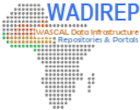High resolution (12km) regional climate simulations were carried out by the researchers at Karlsruhe Institute of Technology, Institute of Meteorology and Climate Research, Atmospheric Environmental Research (KIT/IMK-IFU) as part of the West Africa Science Service Center on Climate Change and Adapted Land Use (WASCAL) Project. One of the goals of the WASCAL project is to provide the best accuracy in regional climate simulations over the entire West Africa region for a large proportion of the 21st century. The regional climate model employed in the project was the Weather Research and Forecasting Model version 3.5.1 (WRFv3.5.1) forced by three global circulation models (GCMs) under the Representative Concentrative Pathways 4.5 (RCP 4.5). The forcing GCMs are: the Max Planck Institute Earth System Model (MPI-ESM-MR, Stevens et al. 2013), the General Fluid Dynamics Laboratory Earth System Model (GFDL-ESM2M, Dunne et al. 2012), and the Hadley Global Environment Model (HadGEM2-ES, Collins et al. 2011). Further control runs with ERA-Interim reanalysis products (Dee et al. 2011) were also carried out for model verification and bias correction. Therefore, de-accumulated daily outputs of TOA incident shortwave radiation, obtained from the 3-hourly simulations of WRFv3.5.1, driven by GFDL-ESM2M, are hereby presented.
Data and Resources
| Field | Value |
|---|---|
| Modified | 2025-03-31 |
| Release Date | 2019-09-17 |
| Identifier | ece4aa61-bb5e-48ad-8aa7-b97c0a799063 |
| Covered Regions/Countries | |
| Temporal Coverage | Tuesday, October 18, 2016 (All day) |
| Language | English |
| Contact Name | Dr. Olusegun, Christiana |
| Contact Email |

![[Open Data]](https://assets.okfn.org/images/ok_buttons/od_80x15_blue.png)